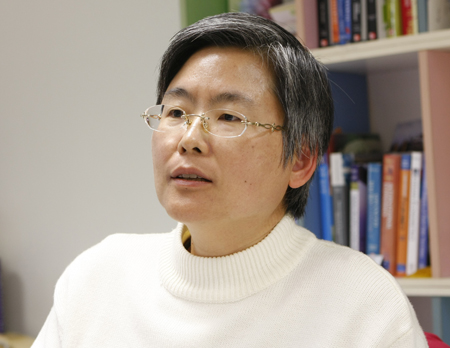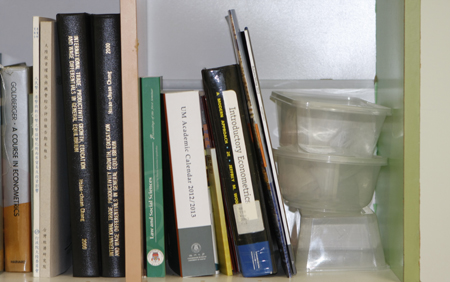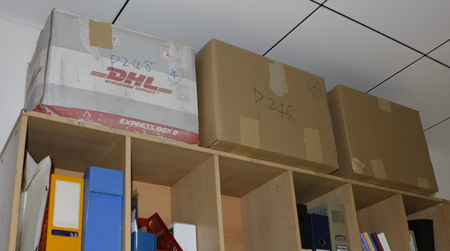In a city like Macao, where the cost of living is skyrocketing and where many people are after fashion and material gratification, how does she, a university professor, manage to live on a mere MOP 2,500 a month? She never throws away any clothes as long as they are still wearable, and always uses her own bowl and chopsticks for environmental protection. In fact even the cleaning ladies on the campus couldn’t hide their curiosity and asked her on more than one occasion, “How can you manage to be so frugal?” She is Dr. Chang Hsiao-Chuan, assistant professor from the Department of Economics, who is a devoted Buddhist and a long-time environmentalist who practices what she preaches.
Environmental Protection Starts at Home & Office
It is the first day of the new semester. Dr. Chang walks briskly into the classroom, wearing the same sun hat she has been wearing for many years. Her clothes are faded from repeated washing but her smile is sunny and bright as ever. She intersperses her lecture with insightful views on environmental protection and interesting real-life examples, which keeps the students laughing and engaged. She always carries a plastic bag full of old markers to the class, careful not to throw away any marker that could still be used.
Growing up in Taiwan, a society that attaches great importance to environmental education, instilled the value of environmental protection in Dr. Chang’s heart at a young age. Studying and working in the United States and Australia for over a decade has exposed her to influence from environmentalists there and reinforced her conviction in environmental protection.
Studying at graduate school in the US, she would pound the pavement looking for second-hand furniture. “Some of the discarded furniture was in a pretty good condition and was totally usable once I got it cleaned. It was really a waste to just dump it in the garbage yard, you know, given the limited resources on earth,” says Dr. Chang. “We shouldn’t squander. We should think about the next generation. How many trees are being cut and how many resources are being squandered to satisfy our craving for fashion and convenience?”
Dr. Chang’s tidy office is full of recycled items. She turns the blank sides of printed paper into scratch paper. She sun-dries used tissue papers for re-use. She keeps a pile of yellowing paper boxes in case she might find some use for them in the future.
One Gram of Wasted Food Is One Too Many
It is reported that nearly 50 billion kilograms of food is wasted on dining tables in China every year, accounting for close to one tenth of the gross grain output, enough to feed 200 million people for an entire year. “It’s really sad to read these mindboggling numbers,” sighs Dr. Chang.
She keeps many food boxes in her office and always takes home a doggy bag every time she dines outside, never minding what other people might think. She saves on transportation by walking between her home and office. She borrows teaching materials from the library or her colleagues.
Dr. Chang says she enjoys such a simple life where she never feels the need to keep up with the Joneses. “If you don’t want what you don’t need, and be grateful for and appreciate what you do have, you will have lasting inner peace and joy, not to mention the added bonus of the satisfaction of knowing that you’re really doing something for environmental protection.”
Dr. Chang’s Monthly Expense
|
|
MOP |
|
Meals |
$1,500 |
|
Electricity |
$0 (government electricity subsidy) |
|
Water |
$40 |
|
Clothes |
$0 |
|
Transportation |
$20 |
|
Telephone |
$40 |
|
Miscellaneous(groceries, snacks, etc) |
$900 |




